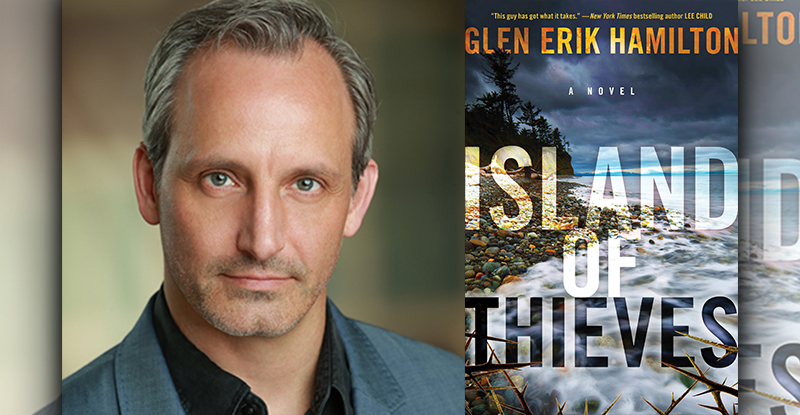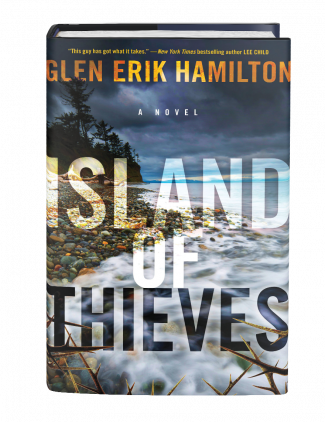Literary Sensei: Marc Olden
By Glen Erik Hamilton
August 10, 2021
I stumbled across my first Marc Olden action thriller at age fourteen, in the crowded, jumbled, beloved racks of McDonald’s Book Exchange in downtown Kirkland, Washington. The book was called Giri, which I first misread as the word Girl thanks to an extended leg on the R, and indeed there was an attractive woman depicted on the cover. Impulses are simple at fourteen. Sex may have caught my eye, but it was the novel’s promise of violence—specifically, martial arts—that held my attention.
It was a prime time for novels with a martial arts angle. Trevanian’s Shibumi and Eric Van Lustbader’s The Ninja had sold well and inspired sequels. Giri seemed to be right on target. I took it home and eagerly devoured the tale of Manny Decker, New York cop and expert karateka, whose investigations bring him into conflict with a serial murderer whose skills exceed even his own. (A cautionary note: the sex and violence in most genre novels of this era are explicit, including violence against women. Rereading certain passages of any thriller from the 1980s can be harrowing.)
What impressed me most about Giri was the detailed descriptions of the martial arts training. Its characters didn’t become lethal combatants through some inherited trait or mystical rite. They mastered their skills the way real people do: years of hard, repetitive instruction from experts and continued practice, which they had to make time for during their regular lives. The realism of that was appealing. A glance at the author’s bio confirmed that Olden wrote what he knew, with expertise in karate and aikido and time spent teaching those skills to the NYPD.
In those pre-internet days, finding more books by an author you liked could be tougher. I routinely scanned the O section of used bookstores, looking for more by Olden and occasionally striking gold. It wasn’t until much later that I learned the full extent of Marc Olden’s bibliography, and his history.
Born in Baltimore in 1933, Olden was raised primarily in New York City and attended Queens College with a degree in creative writing and history. He worked as a press agent and Broadway publicist and gradually moved into writing articles for magazines. That led to his first books, non-fiction works on activist Angela Davis and the cocaine epidemic, both published in 1973.
From here we can make an easy guess: Olden’s research, law enforcement contacts, and having his first books in print inspired him to make the leap into fiction. And an impressive leap it was. Under the pen name Robert Hawkes, Olden launched the Narc series featuring task force agent and all-around badass John Bolt. Almost simultaneously, Olden began a second series: Black Samurai. A Vietnam veteran trained to perfection (again, through long and arduous practice) in the Japanese martial arts, Robert Sand becomes an international agent for justice.
It’s notable that Sand was one of Olden’s few Black protagonists. No interviews are available that might explain his choice to feature primarily white leading men and women, whether a marketing necessity or because Olden didn’t want to be categorized solely as a writer of Black fiction, which was a likely outcome at the time (and unfortunately today). He dedicated the first in the Samurai series to his martial arts teachers, his senseis.
The early ’70s were the hey-day of men’s action-adventure novels, with Donald Pendleton’s Mac Bolan and The Destroyer series on every spinning rack of paperbacks. Like these series, Olden’s Narc and Black Samurai are pure pulp: Fast, brutal, with barely enough time to establish supporting characters before they are killed off. The beginning of each novel finds the protagonist reset and ready for action, no matter what horrors they experienced in the previous escapade.
But Olden’s work was a cut above the usual. Beyond being more grounded in his hand-to-hand fight scenes, he displayed a love of complex plotting, current events, and the slippery nature of justice from the start. His first Black Samurai novel involves Sand aiming to prevent a My Lai massacre on U.S. soil. The Narc series routinely dwells on governments’ inability or unwillingness to challenge the worldwide drug trade.
Olden seemed to be as driven as his heroes; the discipline of his karate training echoed in his work ethic. Between 1973 and 1975, he wrote an astonishing nine Narc novels and eight Black Samurai adventures. From there he segued into a new series: The Harker Files. For once his protagonist wasn’t an unbeatable force; Harker is an investigative reporter for the fictional New York World-Examiner, as prone to getting his butt kicked as finding scoops. Olden wrote four Harker novels and his writing continued to garner praise. The third Harker entry, They’ve Killed Anna (a clear riff on the mysterious death of nuclear power whistleblower Karen Silkwood), earned Olden an Edgar nomination.
Black Samurai earned a notch in pop culture history with the eponymous Jim Kelly movie in 1977. The movie bore little relation to Olden’s books, and the author himself was not involved. The best that can be said is that Kelly was a charismatic screen presence and superb martial artist, but his talents get little chance to shine through the film’s clumsy fight choreography and choppy editing.
The late 1970s found Olden dividing his attention between Harker—the last regular series he would write—and standalone novels. Of these, Poe Must Die is the odd man out. A collage of supernatural forces, real-world figures like Charles Dickens and of course Edgar Allan Poe, and mid-nineteenth century history of New York City. It’s bizarre and thoroughly entertaining. And it doesn’t stray as far as one might guess from Olden’s love of the sweet sciences: one of the lead characters is a veteran bare-knuckle prizefighter named Pierce James Figg, who of course faces a to-the-death match near the end of the book.
While his heroes are warriors of integrity, the world around them is dark.
Once Olden made the transition to standalone novels, he didn’t look back. His work output slowed comparatively, with eight novels in the 1980s (including Giri) and five in the ’90s. Most rode the contemporary wave of pop culture fascination with ninjas and mysterious Asian societies, though in Olden’s case, he drew from historical research and his own experience.
Olden’s books reveal more about his perspective than just martial arts. While his heroes are warriors of integrity, the world around them is dark. Olden’s investigative research and ties to law enforcement may have lent him a cynicism about official structures. Every organization—federal agencies, police departments, corporations, community activists—is tainted by corruption and indifference and racism (the last not limited to white people). Only a stalwart few fight against the tide, and victory is far from assured. Even love is a losing prospect. Many of Olden’s characters are hung up on past relationships, unable to move on. The most our heroes can hope for is winning the current battle, with the war a foregone conclusion. The fight is everything.
Marc Olden’s last novel, The Ghost, was published in 1999 and earned Olden the Literary Fiction Honor Award from the Black Caucus of the American Library Association. He died in 2003. Interest in his work survives; in 2015 Idris Elba announced his intention to adapt Poe Must Die. Plans for a Starz series of Black Samurai executive produced and starring Common made headlines in 2017.
Inspired in part by Olden’s expert narratives, I found my way to training and competing in Tae Kwon Do and boxing and other sports starting in my late teens. And like Olden, that joy of practice has continued throughout my life and informed my writing. My novels feature Van Shaw, raised as a professional thief (and occasional street brawler) who learns discipline and more effective combatives via the Army Rangers. Now out of the military and semi-reformed, MMA remains a part of Shaw’s identity.
Discipline, and tenacity, and continuous learning. Marc Olden took these lessons from the martial arts and turned them into a successful writing career. But he might be the first to point out that prospective authors don’t need to join a dojo to follow his example. The sensei has already shown the path.
For more on Marc Olden, including his full bibliography, visit marcolden.com.
Read More: Our review of Island of Thieves by Glen Erik Hamilton
About Island of Thieves by Glen Erik Hamilton:
Van Shaw is hired to evaluate the safeguards for the art collection of eccentric business magnate Sebastien Rohner. Then Rohner reveals to Van the real reason he’s been recruited: to prevent another professional burglar from stealing the art. Rohner wants to set a thief to catch a thief.
While questioning the bizarre nature of the job, Van accepts the lucrative offer and arrives at the island estate during an international summit that Rohner is hosting. Shortly after beginning his surveillance of Rohner’s highly secure gallery wing, Van stumbles across the murdered body of one of the honored guests along the rocky shore. Wary of Rohner’s true intentions, Van knows the homicide detectives on the case—and perhaps Rohner as well—believe he’s the prime suspect and will turn his life upside down in their search for proof.
Van begins to hunt for the murderer himself, but scrutiny only digs his hole deeper, as one of Rohner’s own executives is also killed and the Seattle police find concrete evidence placing Van at the scene. With no other options, he goes on the run, alone and unaided. He’s hunted by the cops, the enraged Rohner, and by a pair of psychopathic hitmen who chase Van from one coast to the next. To clear his name, Van Shaw will have to uncover the hidden motive of corporate espionage at a global level, even with a band of killers on his tail, determined to add Van to their growing list of victims.
Comments are closed.





I grew up reading the Black Samurai and some of Marc Olden’s novels. The Black Samurai pointed me in the direction of The Executioner and other series. It’s nice reading this great piece and bringing back memories of those books.
Money Heist – Season 5 English Full Movie Watch Online Free
Watch Venom 2 (2021) Full Movie Online free
Verzuz TV Live Stream Online
How to Watch Verzuz Battle Live Online
Verzuz TV Live Streaming Online
It’s worth it.